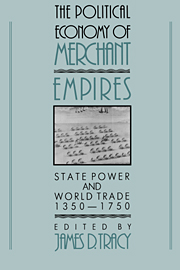Book contents
- Frontmatter
- Contents
- Acknowledgments
- Introduction
- 1 Institutions, Transaction Costs, and the Rise of Merchant Empires
- 2 Merchants and States
- 3 The Rise of Merchant Empires, 1400–1700: A European Counterpoint
- 4 Europe and the Wider World, 1500–1700: The Military Balance
- 5 The Pirate and the Emperor: Power and the Law on the Seas, 1450–1850
- 6 Transport Costs and Long-Range Trade, 1300–1800: Was There a European “Transport Revolution” in the Early Modern Era?
- 7 Transaction Costs: A Note on Merchant Credit and the Organization of Private Trade
- 8 Evolution of Empire: The Portuguese in the Indian Ocean During the Sixteenth Century
- 9 Comparing the Tokagawa Shogunate with Hapsburg Spain: Two Silver-Based Empires in a Global Setting
- 10 Colonies as Mercantile Investments: The Luso-Brazilian Empire, 1500–1808
- 11 Reflections on the Organizing Principle of Premodern Trade
- Selected Bibliography of Secondary Works
- Index
Introduction
Published online by Cambridge University Press: 25 March 2010
- Frontmatter
- Contents
- Acknowledgments
- Introduction
- 1 Institutions, Transaction Costs, and the Rise of Merchant Empires
- 2 Merchants and States
- 3 The Rise of Merchant Empires, 1400–1700: A European Counterpoint
- 4 Europe and the Wider World, 1500–1700: The Military Balance
- 5 The Pirate and the Emperor: Power and the Law on the Seas, 1450–1850
- 6 Transport Costs and Long-Range Trade, 1300–1800: Was There a European “Transport Revolution” in the Early Modern Era?
- 7 Transaction Costs: A Note on Merchant Credit and the Organization of Private Trade
- 8 Evolution of Empire: The Portuguese in the Indian Ocean During the Sixteenth Century
- 9 Comparing the Tokagawa Shogunate with Hapsburg Spain: Two Silver-Based Empires in a Global Setting
- 10 Colonies as Mercantile Investments: The Luso-Brazilian Empire, 1500–1808
- 11 Reflections on the Organizing Principle of Premodern Trade
- Selected Bibliography of Secondary Works
- Index
Summary
“From experience, your lordships ought to know very well that in India trade is driven and maintained under the protection and favor of your own weapons, just as the weapons are furnished from the profits of trade, in such wise that trade cannot be maintained without war, nor war without trade.”
Jan Pieterszoon Coen to the Heren XVII (Board of Directors of the United East India Company), Bantam, 27 December 1614.The Rise of Merchant Empires dealt with changes in the growth and composition of long-distance trade between roughly 1450 and 1750. This volume, The Political Economy of Merchant Empires, focuses on why European concerns eventually achieved a dominant position in global trade, at the expense (especially in Asia) of well-organized and well-financed rivals. In responding to this question, one can argue that Europeans had better means of transportation, or better business methods, including more sophisticated forms of credit. Alternatively, one can contend that Asian business methods were in no way inferior, and that Europeans owed their triumphs solely to the use of superior armaments for commercial aims. Finally, one may conclude, as Professor Steensgaard does in an important essay, that Europeans succeeded because they created forms of organization in which “the use of violence was subordinated to the rational pursuit of profit.”
- Type
- Chapter
- Information
- The Political Economy of Merchant EmpiresState Power and World Trade, 1350–1750, pp. 1 - 21Publisher: Cambridge University PressPrint publication year: 1991
- 2
- Cited by

